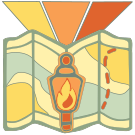Learn About Attention: Difference between revisions
no edit summary
imported>Jacob Robertson |
imported>Jacob Robertson No edit summary |
||
| Line 15: | Line 15: | ||
This trail is designed to take you to a place where you have a basic understanding of the [[Attention|Beacon of Attention]], including the Lenses of Mindfulness, Non-Judgement and Presence, as well as the Credo of Experience the Now. Once you've completed this trail, it is recommended you read through the content on the [[Attention]] page. | This trail is designed to take you to a place where you have a basic understanding of the [[Attention|Beacon of Attention]], including the Lenses of Mindfulness, Non-Judgement and Presence, as well as the Credo of Experience the Now. Once you've completed this trail, it is recommended you read through the content on the [[Attention]] page. | ||
== Step 1 - | == Step 1 - Learn About Presence == | ||
=== Lookouts === | === Lookouts === | ||
* '''Lookout: Focusing on the Present:''' As you practice, discover how you can choose to focus solely on what is in front of you, instead of being carried away by thoughts. | |||
* '''Lookout: Awakening from Daydreams:''' Observe how ambient sounds can serve as anchors, pulling you out of your daydreams and bringing you back to reality. | |||
=== Skill: Use Sounds to be Present === | |||
* You're outside, maybe walking your dog, or sitting in your backyard. It's a regular part of your day. | |||
* As you're enjoying your surroundings, let your mind wander freely. Let it daydream. | |||
* Amidst the daydreaming, bring your attention to the sounds around you. | |||
* The distant sound of traffic, the rustling leaves, the birds singing - tune into one of these sounds, whichever one you like. | |||
* Each time a particular sound catches your attention, let it pull you out of your daydream, anchoring you back to reality. | |||
* Acknowledge the thought or daydream that was interrupted by the sound, let it go, then return to listening. | |||
* Continue this practice of allowing sounds to interrupt your daydreams, noting the shift in your attention. | |||
* Reflect on how the sounds around you can serve as tools to bring you back to the present moment. | |||
* Incorporate this practice into your regular outdoor time to cultivate the habit of using sounds as anchors to reality. | |||
=== Checkpoints === | |||
* '''Checkpoint: Focusing on the Present:''' Can you consciously direct your focus on the present moment, particularly when your mind starts to wander? | |||
* '''Checkpoint: Awakening from Daydreams:''' Can you use ambient sounds as triggers to return from daydreams or distractions back to reality? | |||
== Step 2 - TODO == | |||
=== Lookouts === | |||
=== Skill: "Cup of Thoughts" - Thoughts can be observed === | |||
=== Checkpoints === | |||
== Step 3 - TODO == | |||
=== Lookouts === | |||
=== Skill: "Sound Soak" - Sounds can pull you out of a daydream === | |||
=== Checkpoints === | |||
TODO - select the two | TODO - select the two | ||
* '''Lookout: Observation of Thoughts:''' As you go about your day, you'll begin to see how you can observe your own thoughts like a bystander, not a participant. | * '''Lookout: Observation of Thoughts:''' As you go about your day, you'll begin to see how you can observe your own thoughts like a bystander, not a participant. | ||
| Line 25: | Line 62: | ||
* '''Lookout: Focusing on the Present:''' As you practice, discover how you can choose to focus solely on what is in front of you, instead of being carried away by thoughts. | * '''Lookout: Focusing on the Present:''' As you practice, discover how you can choose to focus solely on what is in front of you, instead of being carried away by thoughts. | ||
* '''Lookout: Awakening from Daydreams:''' Observe how ambient sounds can serve as anchors, pulling you out of your daydreams and bringing you back to reality. | * '''Lookout: Awakening from Daydreams:''' Observe how ambient sounds can serve as anchors, pulling you out of your daydreams and bringing you back to reality. | ||
==== Skill: "Commuter's Calm" - Emotions can be observed ==== | ==== Skill: "Commuter's Calm" - Emotions can be observed ==== | ||
| Line 52: | Line 74: | ||
* Use this usually stressful time to become more in tune with your emotions and their transient nature. | * Use this usually stressful time to become more in tune with your emotions and their transient nature. | ||
==== Skill: "Mindful Munching" - You can focus on what is in front of you ==== | ==== Skill: "Mindful Munching" - You can focus on what is in front of you ==== | ||
| Line 72: | Line 86: | ||
* Clean up after your meal, maintaining your focus on the present moment. | * Clean up after your meal, maintaining your focus on the present moment. | ||
=== Checkpoints === | === Checkpoints === | ||
| Line 88: | Line 93: | ||
* '''Checkpoint: Emotion Observation:''' Can you identify emotions as they surface and observe them without being consumed by them? | * '''Checkpoint: Emotion Observation:''' Can you identify emotions as they surface and observe them without being consumed by them? | ||
* '''Checkpoint: Impermanence of Thoughts and Emotions:''' Do you recognize the transitory nature of your thoughts and emotions? | * '''Checkpoint: Impermanence of Thoughts and Emotions:''' Do you recognize the transitory nature of your thoughts and emotions? | ||
== Destination == | == Destination == | ||
